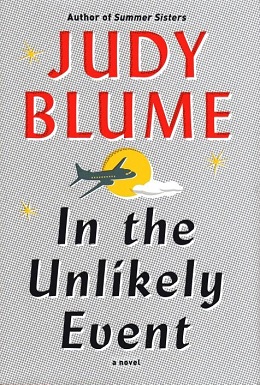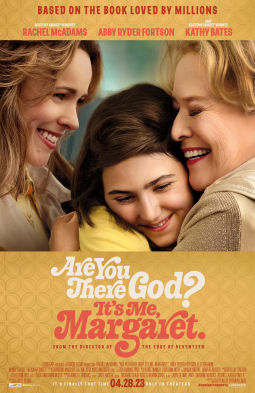
Judith Blume is an American writer of children's, young adult, and adult fiction. Blume began writing in 1959 and has published more than 25 novels. Among her best-known works are Are You There God? It's Me, Margaret. (1970), Tales of a Fourth Grade Nothing (1972), Deenie (1973), and Blubber (1974). Blume's books have significantly contributed to children's and young adult literature. She was named one of the 100 most influential people in the world by Time magazine in 2023.

Are You There God? It's Me, Margaret. is a middle-grade novel by American writer Judy Blume, published in 1970. Its protagonist, Margaret Simon, is a sixth-grader who grows up without a religious affiliation because of her parents' interfaith marriage. This contemporary realistic novel was popular with middle-grade readers in the 1970s for its relatable portrayal of a young girl confronting early-adolescent anxieties, such as menstruation, brassieres and boys. The recipient of national honors and book awards, the novel has been challenged for its frank discussion of sexual and religious topics.

Summer Sisters (ISBN 0-385-32405-7) is a 1998 novel by Judy Blume. It focuses on the life of two fictional characters, the girls Victoria Leonard (Vix) and Caitlin Somers.

Tiger Eyes is a young adult novel written by Judy Blume in 1981 about a 15-year-old girl attempting to cope with the unexpected death of her father. In 2012, the novel was adapted into a film of the same name, directed by Judy's son, Lawrence Blume, and starring Willa Holland as Davey Wexler. Davey is often sad, depressed and defensive on everything. She has a short breakdown at her brother, Jason. Her mom becomes incapable of doing things about the house, making Davey more depressed.

Superfudge is a children's novel by Judy Blume, published in 1980. It is the sequel to Tales of a Fourth Grade Nothing and Otherwise Known as Sheila the Great and is the third in the Fudge series.

Blubber is a children's novel by Judy Blume first published in 1974. The narrator of the story is Jill Brenner, a Pennsylvania fifth-grader who joins her classmates in ostracizing and bullying Linda, an awkward and overweight girl. Linda gives an oral class report about whales and is hence nicknamed "Blubber" by her peers.

Vincent "Vinnie" Patterson is a fictional character from the Australian soap opera Home and Away, played by Ryan Kwanten. He made his first on screen appearance on 14 July 1997 and departed on 1 March 2002. The character made a brief return appearance in the episode shown on 19 November 2004 without Kwanten reprising the role, appearing wearing a bear costume and played by an uncredited actor.

Iggie's House is a 1970 young adult novel by Judy Blume. The story concerns Winnie, whose best friend Iggie has moved away. The new family moving into Iggie's house are the first African-American people in the neighborhood. While Winnie is quick to make friends with the new kids, she realizes that some people, possibly including her own parents, have trouble seeing past a person's color.

Otherwise Known as Sheila the Great is a children's novel by Judy Blume, first published in 1972. It is a spin-off novel to the Fudge series, being set shortly after Tales of a Fourth Grade Nothing, and centers on Peter Hatcher's nemesis, Sheila Tubman, and her family. Peter himself only appears briefly at the beginning and Fudge does not appear at all, although he is briefly mentioned.

Forever... is a 1975 novel by Judy Blume dealing with teenage sexuality. Because of the novel's content it has been the frequent target of censorship and appears on the American Library Association list of the 100 Most Frequently Challenged Books of 1990–2000 at number seven.

Starring Sally J. Freedman as Herself is a 1977 young adult novel by Judy Blume. It is set in 1947 and follows the imaginative 10-year-old Sally, who likes to make up stories in her head, her family moves from New Jersey to Miami Beach. While not as controversial as some of her other novels, Blume does manage to address the following themes of late 1940s life in America: racism, anti-Semitism and sibling rivalry. This novel is her most autobiographical, with many parallels between Blume's own life and that of Sally. Blume has said, "Sally is the kind of kid I was at ten."

Wifey is a 1978 American novel written by Judy Blume.

Here's to You, Rachel Robinson is a 1993 young adult novel by Judy Blume, the sequel to Just as Long as We're Together. It is an allusion to the Simon and Garfunkel song, "Mrs. Robinson".

Letters to Judy: What Your Kids Wish They Could Tell You is a book published by Judy Blume in 1986. The book is a collection of letters from readers of her children's books, primarily children and teenagers, who wrote to Blume about problems like rejection by peers, feelings of neglect at home, or confusion about puberty, as well as more serious issues like living with disabilities, having family members be incarcerated, or surviving sexual abuse. Also included in the book are autobiographical essays about Blume's own experiences.
Joel Nash is a fictional character from the Australian soap opera Home and Away played by David E Woodley. Joel made his first appearance on 18 February 1998 and departed on 11 October 2000.

Tiger Eyes is a 2012 film directed by Lawrence Blume based on the 1981 young adult novel of the same name, written by Judy Blume, and stars Willa Holland, Amy Jo Johnson and Tatanka Means. It follows the story of Davey, a young girl attempting to cope with the sudden death of her father and the subsequent uprooting of her life.

In the Unlikely Event is a 2015 novel by Judy Blume. It follows fifteen-year-old Miri Ammerman and her family and friends as they cope with three plane crashes from December 1951 to February 1952 in their home of Elizabeth, New Jersey. This was Blume's first adult book in 17 years and one of only four adult books she has written in her career.

Are You There God? It's Me, Margaret. is a 2023 American coming-of-age comedy-drama film written and directed by Kelly Fremon Craig, based on the 1970 novel of the same name by Judy Blume. The film stars Abby Ryder Fortson as the title character, along with Rachel McAdams, Elle Graham, Benny Safdie, and Kathy Bates.

















